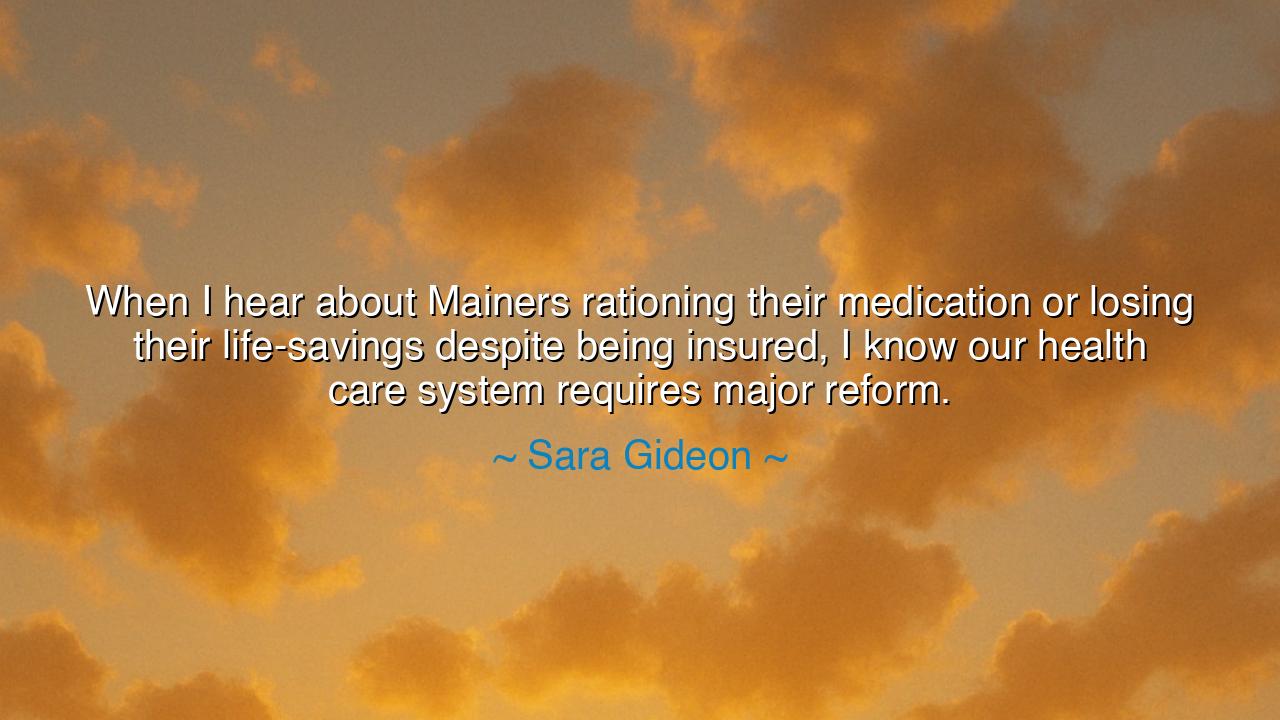
When I hear about Mainers rationing their medication or losing
When I hear about Mainers rationing their medication or losing their life-savings despite being insured, I know our health care system requires major reform.






The leader Sara Gideon, a voice for compassion and justice, once declared: “When I hear about Mainers rationing their medication or losing their life-savings despite being insured, I know our health care system requires major reform.” These words carry the tone of both sorrow and resolve, for they arise not from theory but from the cries of the afflicted. They speak to a truth as ancient as any law of humanity: that when a society allows the sick to suffer for lack of care, it betrays its own soul. Gideon’s words are not merely political—they are moral. They call upon the spirit of a nation to remember that compassion is the foundation of civilization, and that the health of a people is the true measure of its greatness.
In the time of the ancients, the healer’s art was sacred. From the temples of Asclepius in Greece to the halls of medicine in Egypt, care for the sick was seen as a divine duty, not a privilege of the wealthy. The philosopher Hippocrates himself taught that “the physician must care for all who suffer, without distinction.” Yet in our modern age, the sacred covenant between healer and patient has been strained by systems built for profit rather than mercy. Gideon’s lament—that people in her home state, Mainers, must ration medication or lose all they own simply to survive—reveals a profound injustice. It is not the sickness that destroys them, but the system meant to save them.
The origin of Gideon’s words lies in her service to the people of Maine, where she listened to the stories of neighbors who worked hard, paid for insurance, and still found themselves broken by medical costs. She speaks of mothers who split their pills to make them last, of elders who must choose between warmth and medicine, and of families who spend their final days not in peace, but in panic over debt. These are not isolated tragedies—they are symptoms of a deeper illness within society. When the people’s health becomes a burden rather than a birthright, when care is rationed while wealth is hoarded, the soul of the nation begins to decay.
History offers many reflections of this truth. In the early twentieth century, as industrialization spread across the world, workers often faced injury and illness with no safety net. In the coal mines of Pennsylvania or the factories of England, the poor were left to die if they could not pay. But then arose voices like that of Florence Nightingale and the reformers of social medicine, who declared that the well-being of each person was essential to the strength of all. Their compassion birthed the idea of public health, of hospitals open to all, and of systems that valued human life above coin. Their work was not merely the construction of policies—it was the restoration of a moral order. Sara Gideon speaks in that same lineage of reformers, calling us once more to that ancient truth.
Her words remind us that health is not only the absence of disease, but the presence of dignity. When a person is forced to sacrifice their life-savings for survival, they are made a prisoner of circumstance. When a family must ration medication, hope itself is rationed alongside it. This is not the natural state of the world, but a man-made failing—a system that has forgotten its sacred purpose. True reform, as Gideon envisions it, is not a mere adjustment of policy but a renewal of conscience. It is the reawakening of our shared humanity, where care for the weak and suffering becomes not a question of cost, but of character.
To understand this truth is to understand the nature of civilization itself. A nation is not defined by its wealth, its armies, or its monuments, but by how it treats the most vulnerable among its people. Gideon’s words echo through the ages as both an indictment and an invitation: an indictment of systems that allow suffering in the shadow of abundance, and an invitation to build something nobler. Every reform begins first in the heart, when people recognize that another’s pain is not theirs alone. When compassion becomes policy, and justice becomes structure, then healing—true healing—can begin.
The lesson, then, is this: Do not turn away from the suffering of your neighbor. See in their struggle a reflection of your own humanity. Advocate for health care that uplifts, not excludes; for systems that protect life rather than profit from it. Support the reformers who dare to speak the hard truths and act upon them. And in your daily life, practice the ancient virtue of empathy—help the sick, comfort the weary, and lend your voice to those who cannot speak.
So remember, O keeper of wisdom, the teaching of Sara Gideon: that no society can call itself just while its people must choose between food and medicine, between life and livelihood. Let us not be a people who avert our eyes from the suffering in our midst, but a people who act with courage to mend what is broken. For in the healing of one person lies the healing of all. When we lift our sick, we lift our nation—and when we restore compassion to the heart of care, we restore the soul of humanity itself.






AAdministratorAdministrator
Welcome, honored guests. Please leave a comment, we will respond soon